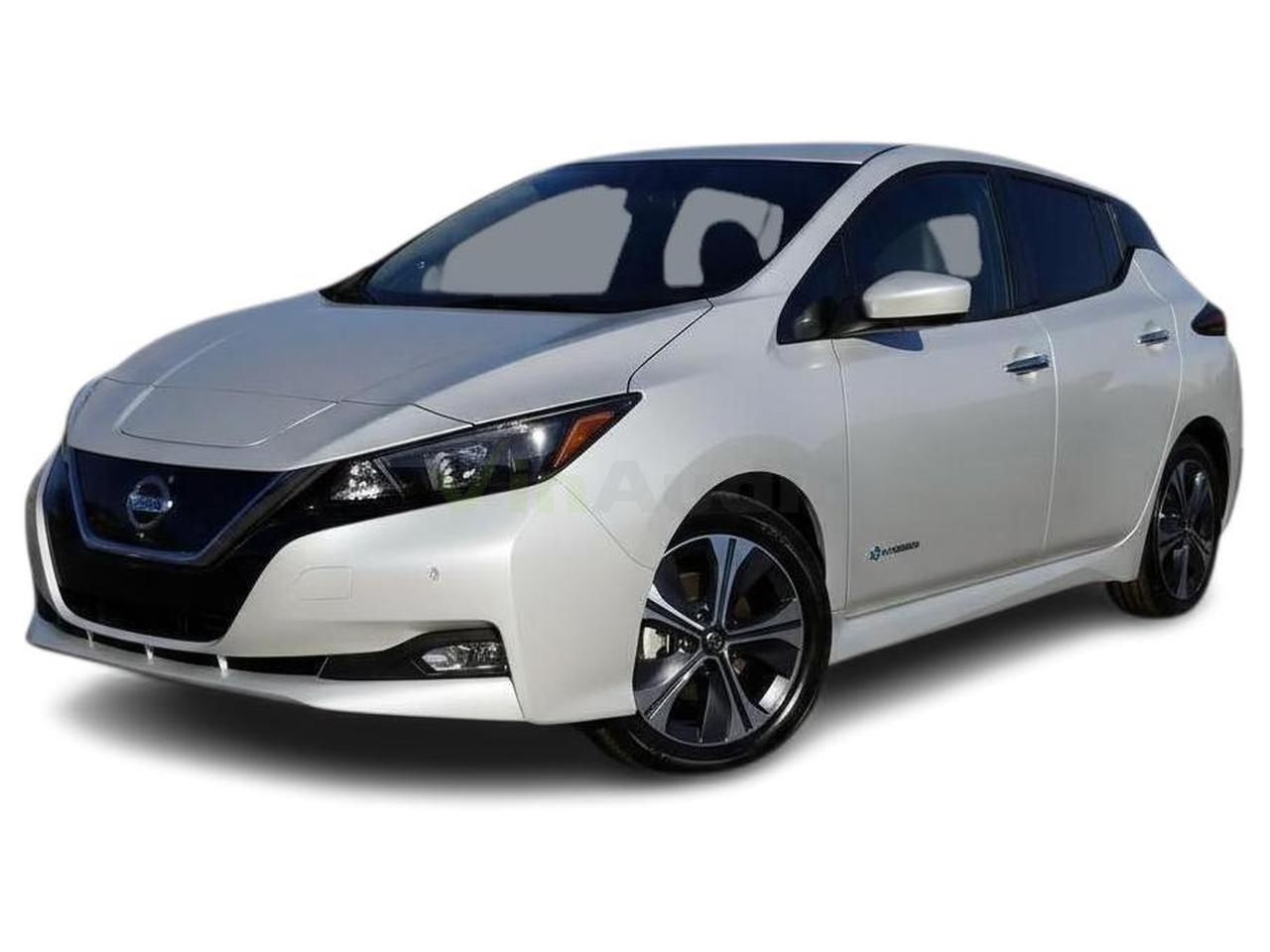The 2019 Nissan LEAF is a fully electric hatchback, building on Nissan's pioneering work in EV technology. Key trims include the S, SV, and SL, with the 'Plus' models offering extended range. New pricing started around $30,000, but could reach $40,000+ for higher trims. Its popularity stems from its affordability, practicality, and zero-emission driving, making electric vehicle ownership accessible to a wider audience. It stands out as a user-friendly and reasonably priced EV option. The LEAF has been in production since 2010.
The Good
The 2019 Nissan LEAF offers peppy acceleration and a smooth, quiet ride, appealing to emotional buyers seeking a fun driving experience. Its efficiency translates to significant savings on fuel costs, offering practical buyers excellent value. The comfortable interior and available tech add to its appeal. Reliability is generally good, further enhancing its value proposition.
The Bad
The 2019 Nissan LEAF's weaknesses include battery degradation over time, especially in hot climates, impacting range. The base model's range is also limited. The e-Pedal, while innovative, can take some getting used to. Charging infrastructure availability can be a concern depending on location. The interior materials aren't the most premium.
2019 Nissan LEAF: Quick Overview
- Engine Options:
- Standard: 40 kWh lithium-ion battery
- LEAF Plus: 62 kWh lithium-ion battery
- Horsepower:
- 40 kWh: 147 hp
- 62 kWh: 214 hp
- Fuel Economy (MPGe):
- 40 kWh: 124 city / 99 highway / 112 combined
- 62 kWh: 118 city / 97 highway / 108 combined
- 0-60 Times:
- 40 kWh: Approximately 7.4 seconds
- 62 kWh: Approximately 6.7 seconds
- Towing Capacity: Not Recommended
- Trim-Level Features:
- S: Automatic emergency braking, e-Pedal, 8-inch touchscreen, Apple CarPlay & Android Auto.
- SV: Adds adaptive cruise control, blind-spot monitoring, rear cross-traffic alert, navigation.
- SL: Adds leather seats, Bose audio system, surround-view monitor.
- S Plus: Extended range battery.
- SV Plus: Extended range battery with additional features over standard SV.
- SL Plus: Extended range battery with all the premium features.
2019 Nissan LEAF Specifications
Vehicle Information
| Year | 2019 |
| Make | Nissan |
| Model | LEAF |
| Trim | - |
| Style | - |
| Type | Sedan |
| Category | Compact Car |
Manufacturing Details
| Made In | Japan |
| Manufacturing City | OPPAMA PLANT, YOKOSUKA-SHI |
Dimensions
| Doors | 4-Door |
| Curb Weight | - |
| Gross Vehicle Weight Rating | - |
| Overall Height | - |
| Overall Length | - |
| Overall Width | - |
| Wheelbase Length | - |
| Standard Seating | - |
Engine & Performance
| Engine | - |
| Engine Size | - |
| Engine Cylinders | - |
| Transmission | transmission |
| Transmission Type | - |
| Transmission Speeds | - |
| Drivetrain | Rear-Wheel Drive |
Additional Features
| Anti-Brake System | - |
| Steering Type | - |
Pricing
| Manufacturer Suggested Retail Price (MSRP) | - |
| Invoice Price | - |
| Delivery Charges | - |
Vehicle History Report
Vehicle
Specifications
Specifications
Ownership
History
History
All History
Events
Events
NMVTIS Title
History Check
History Check
Salvage/Rebuilt
Check
Check
Accident
Check
Check
Theft
Check
Check
Open Lien
Check
Check
Past Sale
Listings
Listings
Safety
Recalls
Recalls
Odometer
Check
Check
Market Price
Analysis
Analysis
What Problems Does the 2019 Nissan LEAF Have?
Frequently reported problems for the 2019 Nissan LEAF often revolve around battery degradation, particularly in hotter climates. Owners have noted reduced range over time, especially with the 40 kWh battery. Another concern is the capacity loss warning system, which some feel is overly sensitive. There have been some reports of issues with the charging system, although these are less common. Recalls have been issued for various issues, including problems with the electronic parking brake and potential software glitches affecting the vehicle's control systems. Long-term reliability concerns center around the battery's longevity and its ability to maintain its capacity over several years of use. Earlier LEAF models (pre-2018) had similar battery degradation issues, and while Nissan has made improvements, it remains a point of concern for potential buyers. Some owners have also reported issues with the 12V battery needing frequent replacement. Regular software updates are crucial to address any potential glitches and optimize battery performance.
How long will the 2019 Nissan LEAF last?
Based on owner data and typical maintenance, a 2019 Nissan LEAF can be expected to provide 150,000 to 200,000 miles or 10-12 years of service. This assumes regular maintenance, including timely battery health checks and adherence to Nissan's recommended service schedule. Long-term durability primarily hinges on battery health. The main weakness over time is battery degradation, which can significantly reduce range. Proper charging habits (avoiding frequent fast charging and extreme temperatures) can help mitigate this. Other components, like the electric motor and other drivetrain parts, are generally reliable, but regular inspections are recommended.
What Technology & Safety Features are Included?
The 2019 Nissan LEAF boasts a solid suite of built-in tech. The standard 8-inch touchscreen includes Apple CarPlay and Android Auto. Higher trims offer navigation, a Bose premium audio system, and NissanConnect services.
Driver-assistance features are plentiful. Standard features include automatic emergency braking, lane departure warning, and blind-spot monitoring. Higher trims add adaptive cruise control, rear cross-traffic alert, and Nissan's ProPILOT Assist, which provides semi-autonomous driving capabilities on highways.
Safety features include multiple airbags, vehicle dynamic control, and traction control. Optional features include a surround-view monitor for easier parking and maneuvering.
Crash-test ratings from the NHTSA and IIHS are generally good. The 2019 LEAF received a 5-star overall safety rating from the NHTSA. The IIHS gave it a "Top Safety Pick" award when equipped with optional LED headlights. Overall, the 2019 LEAF offers a comprehensive package of tech, entertainment, and safety features, making it a competitive choice in the EV market. It uses a CHAdeMO charging port.
Driver-assistance features are plentiful. Standard features include automatic emergency braking, lane departure warning, and blind-spot monitoring. Higher trims add adaptive cruise control, rear cross-traffic alert, and Nissan's ProPILOT Assist, which provides semi-autonomous driving capabilities on highways.
Safety features include multiple airbags, vehicle dynamic control, and traction control. Optional features include a surround-view monitor for easier parking and maneuvering.
Crash-test ratings from the NHTSA and IIHS are generally good. The 2019 LEAF received a 5-star overall safety rating from the NHTSA. The IIHS gave it a "Top Safety Pick" award when equipped with optional LED headlights. Overall, the 2019 LEAF offers a comprehensive package of tech, entertainment, and safety features, making it a competitive choice in the EV market. It uses a CHAdeMO charging port.
What Colors Options are Available?
Exterior Colors
Glacier White
Gun Metallic
Super Black
Brilliant Silver Metallic
Deep Blue Pearl
Scarlet Ember Tintcoat
Pearl White Tricoat
Interior Colors
Charcoal Cloth
Light Gray Cloth
2019 Nissan LEAF Prices and Market Value
The 2019 Nissan LEAF had a starting MSRP of around $30,000 for the base S trim, while the higher-end SL Plus could reach over $40,000. Current used market prices range from approximately $12,000 to $25,000, depending on the trim, battery health, and mileage. The LEAF experiences significant depreciation, largely due to concerns about battery degradation and the rapid advancement of EV technology. Factors affecting resale value include battery condition, mileage, trim level (Plus models hold value better), and overall condition. Government incentives available at the time of purchase also impacted the initial price and, consequently, the used market value.
2019 Nissan LEAF Cost of Ownership
The 2019 Nissan LEAF is generally economical to own. Insurance costs are comparable to other compact cars. Fuel costs are significantly lower than gasoline vehicles, as you only pay for electricity. Maintenance is also typically less expensive due to fewer moving parts. However, potential battery replacements are a major long-term cost concern. Repair costs are generally average, but specialized EV repairs can be pricier. Overall, the LEAF offers lower running costs but requires careful consideration of potential battery-related expenses.
2019 Nissan LEAF Fuel Efficiency
Fuel Type
Electric
Fuel Capacity
-
City Mileage
-
Highway Mileage
-
2019 Nissan LEAF Safety Rating
NHTSA
2019 Nissan LEAF Insurance
Insurance for a 2019 Nissan LEAF is moderately priced, reflecting its status as a Sedan with strong safety ratings and
reasonable repair costs.
reasonable repair costs.
How Does the 2019 Nissan LEAF Compare to Other Sedan?
The 2019 Nissan LEAF competes with EVs like the Chevrolet Bolt EV, Hyundai Kona Electric, and Kia Niro EV. In terms of performance, the Bolt EV offers slightly better acceleration and range, while the Kona Electric and Niro EV provide a more crossover-like driving experience. Feature-wise, the LEAF is competitive, offering a good range of tech and safety features, although some rivals may have more advanced driver-assistance systems. Reliability is a key area where the LEAF faces scrutiny due to battery degradation concerns. The Bolt EV has also faced its own recall issues. Price-wise, the LEAF is generally more affordable than some of its competitors, making it an attractive option for budget-conscious buyers.
Alternatives to consider include the Chevrolet Bolt EV for its longer range and peppier performance, and the Hyundai Kona Electric or Kia Niro EV for their crossover styling and similar EV benefits. Depending on budget and priorities, the LEAF remains a solid choice, especially if battery health is carefully assessed on a used model. The Tesla Model 3 is another alternative, but at a higher price point.
Alternatives to consider include the Chevrolet Bolt EV for its longer range and peppier performance, and the Hyundai Kona Electric or Kia Niro EV for their crossover styling and similar EV benefits. Depending on budget and priorities, the LEAF remains a solid choice, especially if battery health is carefully assessed on a used model. The Tesla Model 3 is another alternative, but at a higher price point.
Ranks #917 Sedan
| 1 | 2023 Toyota Camry | (5.0★) |
| 2 | 2023 Honda Accord | (0.0★) |
| 3 | 2023 Lexus ES | (0.0★) |
| 4 | 2024 Subaru Legacy | (5.0★) |
| 5 | 2022 Mazda MX-30 | (4.0★) |
| 6 | 2024 BMW M3 | (0.0★) |
| 7 | 2023 Ford Mustang | (5.0★) |
| 8 | 2023 Mercedes-Benz AMG GT | (0.0★) |
| 9 | 2023 Audi A3 | (0.0★) |
| 10 | 2023 Chevrolet Camaro | (5.0★) |
| 11 | 2023 Hyundai Elantra Hybrid | (0.0★) |
| 12 | 2023 Nissan Altima | (4.0★) |
| 917 | 2019 Nissan LEAF | (0.0★) |
Final Verdict: Is the 2019 Nissan LEAF a Good Sedan?
The 2019 Nissan LEAF is ideal for commuters and city dwellers seeking an affordable and eco-friendly vehicle. It's worth buying, especially used, if you prioritize a lower initial price and running costs, and if your daily driving needs fall within its range capabilities. A used LEAF Plus model is generally preferable due to the extended range. Carefully inspect the battery health before purchasing any used LEAF, as this significantly impacts its value and usability. If you live in a hot climate or require frequent long trips, other EVs with better thermal management might be a better choice. New, the LEAF might be less compelling given newer and more advanced EVs on the market, unless a significant discount is available.

